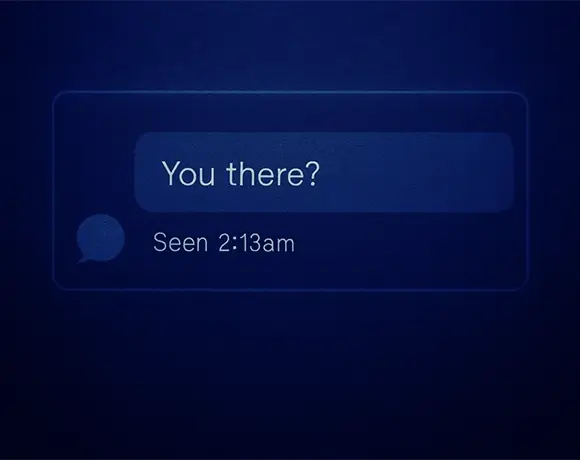Cyberloss is a grief shaped by silence. The kind that creeps in quietly when someone you care about vanishes from your digital life. One day they’re part of your world, woven into your daily scrolls, chats, and laughs … And the next, they’re gone without a trace.
In the spaces where we build online friendships and nurture virtual relationships, there are no guidebooks for what to do when someone simply stops showing up. This kind of digital grief doesn’t come with sympathy cards or ceremonies. It lives in the gaps … unanswered messages, unread statuses, inside jokes that now echo like ghosts. And for many of us, especially those who find connection through online communities, that absence is deeply felt, even if it’s never formally acknowledged.
When online friendships turn real and cyberloss becomes part of our story
If you’ve spent enough time online, whether gaming, on social platforms or in virtual world, you’ve probably made friends you never expected to have. Maybe it started with a shared love of a game, a thousand late-night Discord chats, or just bumping into each other in some digital corner of the internet. However it began, those connections—those virtual relationships—can become just as meaningful as anything in the physical world.
We share jokes, experiences, struggles. We celebrate wins together, whether it’s beating a brutal raid boss, finishing a creative project, or just surviving a rough day. And then, sometimes, without warning, someone disappears.
Maybe they just moved on. Maybe life got in the way. But sometimes… they’re really gone. And that’s when we come face-to-face with something that rarely gets the attention it deserves: cyberloss.
It’s a modern kind of mourning. When someone passes away in the offline world, we usually hear about it through family or mutual friends. There’s a ritual, a moment, a message. But online? One day, the chat just stops. Their last login sits frozen in time. No alert. No closure. Just the quiet weight of not knowing.
And yet, that loss is real. Even if you’ve never seen their face, their absence leaves a mark. Because online friendships aren’t lesser. They’re just different.
In gaming communities, people hold tribute matches. On social media, friends leave messages on untouched profiles. In places like Second Life, entire memorial spaces are built. Every online community finds its own way to mourn, but the common thread? The grief is real.
So today, we’re diving into something many of us carry quietly. How do we cope when a digital friend disappears? How do different spaces honour their memory? And how can we make sure the people we love online aren’t left wondering if the same ever happens to us?
Why virtual relationships deserve the same respect as any other connection
Now, before we go any further, I know there are still people out there who hear “online friend” and instantly roll their eyes. “They’re not real friends. You’ve never even met them.”
But what actually makes a friendship real? Is it shared history? Trust? Inside jokes and late-night conversations? Showing up for each other in the hard moments? Because if that’s the case, then online friendships check every single box.
For many of us, these virtual relationships feel even more genuine than the ones formed through proximity. In digital spaces, we choose our connections based on shared passions, not just circumstance. It’s not about who happens to live next door, it’s about who sees us, who listens, who makes us feel understood.
And for some, those digital bonds are a lifeline. Whether it’s due to chronic illness, mental health challenges, disability, or simply not fitting into the world around them, virtual friendships become their emotional anchor. But when one of those friends is suddenly gone, digital grief sets in … real, heavy, and often unspoken.
Here’s the hard part: that kind of grief can be incredibly isolating. If you say “I lost a friend,” people nod with sympathy. But say “I lost a friend I met online,” and you’re met with confusion. Or worse: dismissal.
That right there is the definition of disenfranchised grief: pain that isn’t taken seriously because it doesn’t fit the script. There’s no funeral, no collective mourning. No real-life circle of friends to share in the loss. It’s what I’d call isolation in online grief … a quiet kind of mourning that sits with you while the world carries on.
That’s why this conversation is important. Because for those of us who’ve felt the ache of losing someone through a screen, we know cyberloss is real. And no one should have to grieve in silence just because their connection didn’t happen in a physical room.


How online communities shape us and why their absence hurts more than we expect
It’s funny how the internet started as a place to look things up, and somehow became where many of us found our people. Real people. Real friends. Some of the most meaningful connections I’ve made didn’t happen in cafés or classrooms. They were born in digital spaces and nurtured through screens.
Take Destiny 2. It’s not just a game I’ve been playing for over a decade. It’s the place where I met an entire group of gaming partners I never would’ve known otherwise. Friends from across time zones and totally different walks of life, brought together by a shared love of loot, lore, and laughing through failure. There’s a unique bond that forms when you’ve spent hours wiping on the same raid boss, and somehow still come back for more.
And then there was Plurk. That odd little hybrid of social feed and forum? It gave me more than just an outlet—it gave me my online tribe. Some of the people I met there became part of my everyday life. One even led me back to Second Life, where our connections went deeper still.
It was through Plurk that I met someone who became more than a friend. What started as a close bond with my best online buddy turned into a long-distance relationship. For two years, I flew back and forth between Australia and New Jersey. It wasn’t perfect. Financially, it wrecked us. But it was real. It was love. And more than anything, it was made possible by a virtual relationship.
That same trip gave me the chance to meet others I’d known online for years. We road-tripped. We explored. We laughed until our faces hurt. And when I returned home, exhausted and broke, I was still so grateful. Because those people? They were worth it. Many of them still are.
One of them even became a lifelong friend I finally met in London. We’d been talking for years before that. It’s wild, isn’t it? How a few online chats can lead to something that anchors you in the real world too.
What makes these connections so special is that they’re built on shared interests, not obligation. No awkward watercooler talk. No small talk about the weather. Just straight into what actually matters. And that’s why online friendships like these don’t feel “less than.” They feel more.
It’s not just my story, either. My son, Antony, isn’t the most outgoing in person, but online? He lights up. Gaming is his safe space. His virtual community. It’s where he builds trust, teamwork, and a few too many Call of Duty rivalries with his sister, Amanda. He snipes us both with way too much enthusiasm, and she talks trash right back like she’s the champ. (She’s not.)
But that’s their world. That’s how they stay connected. And I’ve seen how deeply those friendships matter, especially the day Antony lost two of his closest online friends in the same week.
When he told me, it knocked the wind out of me. Because I’d spoken to those boys.
Classic mum move … I’d see him in an Xbox party, jump in uninvited, and within seconds I was chatting with the gang. They were respectful, funny, full of banter, the kind of people you’re just glad your kid knows.
Then, a month later, Antony quietly told me: one had died by suicide. The other had overdosed.
He’d known about their struggles. He really believed they were turning things around. But they weren’t. And now they’re gone.
To this day, I don’t know how he found out. I haven’t asked. It’s still raw. But he knows he can talk to me. Because I get it.
I understand the depth of virtual friendships. I understand cyberloss. And I know the grief he feels is real.
And that’s why this conversation matters. Not just for people like him, but for people like me. For all of us navigating love, loss, and connection in the digital age.
Why some of our most meaningful connections happen behind a screen
One of the most powerful things about online friendships is how naturally we open up. Sometimes, it’s easier to tell your secrets to someone you’ve never met in person, someone who lives in your screen but sees you more clearly than people in your day-to-day life. There’s a kind of emotional safety in digital spaces. It’s not about hiding who you are, but about finally being who you are without fear of judgment.
I’ve had people share things with me they couldn’t say out loud to their partners or families. Trauma, doubts, dreams, grief. And I’ve done the same. These virtual relationships aren’t some watered-down version of friendship. They’re real, raw, and often incredibly deep.
That’s what makes cyberloss so devastating. When one of those people disappears, it doesn’t feel like losing a username. It feels like losing a part of yourself. A voice you relied on. A routine that became part of your emotional survival. And sometimes, it’s not just a break. It’s the end. And you never see it coming.
Maybe it was someone you gamed with every night. The first to log in. The last to leave. The one who could hold a whole conversation in memes or knew exactly when you needed to hear, “You got this.” Then one day… gone. No ping. No DM. Just silence.
Maybe they moved. Maybe they unplugged. Or maybe… something worse. The hardest part is you don’t know. And that uncertainty becomes part of the grief.
Because unlike in the physical world, where loss is marked by rituals and farewells, navigating cyberloss often means grieving without rituals. No memorial. No obituary. Just a presence that’s no longer there.
Take my friend AncientWisp. He was 80 years old, raiding in Destiny 2 with an oxygen tank and a mic that crackled more than it worked. He’d cough so hard we’d pause the boss fight, half-joking, half-worried. And then… one day, he stopped logging in.
No update. No goodbye. Just a final “last seen” that hasn’t changed since.
We could assume what happened. But that’s all we can do—assume. No family member ever reached out. No mutual friend passed on the news. His profile just froze in time, like someone hit pause on a life that never resumed.
And no, I don’t expect Xbox to offer an obituary tab. But sometimes, I wonder if maybe they should.
How Different Digital Spaces Handle Loss
When online friends vanish and only silence remains
It’s not just a gaming thing.
In Second Life, I had a neighbour, sweet, creative, always decorating her place, always chatting. One day she was there, making plans. The next? Gone. No goodbye. No “brb.” Her partner was completely lost, and the rest of us could only wonder. No one ever found out what happened.
And unfortunately, stories like that aren’t rare in virtual communities. A long-time Second Life resident told me they had a friend who vanished in 2021 after more than a decade of online friendship. For a year, people kept logging in, hoping. Waiting. But that log-in never came. That’s the worst part … the not knowing. The quiet, drawn-out ache of digital grief with no answers.
Back in the days of Plurk, we had this wonderfully weird, tight-knit group. Daily posts. Inside jokes. And a shared obsession with keeping our karma at 100. One day, one of our regulars just… stopped. At first, it was odd. Then it became unsettling.
Eventually, her husband reached out and told one of her close friends that she’d died in a car crash.
That was the first time I truly understood how real this kind of loss is. That someone you laughed with online could be gone, just like that.
Another friend I met through Second Life and Plurk, lived in Chicago. When I visited, she gave me and my friend Steve the most unforgettable tour of the city. She knew the history of every corner, every building. Later, she and Steve stayed in touch, and during a night out together, she suddenly collapsed. She passed away shortly after in hospital.
Her family knew nothing about her digital world.
They didn’t know she was a beloved DJ in Second Life, that she built a space where people gathered to dance, chat, and feel connected. They didn’t know about the virtual community who loved her. Who grieved her. Who built spaces in her honour. It was Steve who had to tell them: your loved one mattered here, too. She built something real. She was loved.
Rest in peace, Madame Maracass.
Even in my Destiny 2 clan, we’ve lost members. I wasn’t especially close to them, but I’d played with them, heard their voices, felt their presence. Their families contacted someone in the clan, who passed the news on. And even though we didn’t know them deeply, our party chat went eerily quiet that day. Because digital loss still echoes, even in brief encounters.
This happens across Discord communities, forums, social media. People vanish. And unless someone from their real life chooses to update their online presence, their memory just drifts. A frozen profile. A blinking green dot that never lights up again. Like a novel someone stopped writing.
Some people, like my friend Noowun, have made a plan. He’s 72 and included instructions in his will to notify his online friends if anything happens. Sounds extreme? Maybe. But if you’ve ever found yourself refreshing someone’s profile endlessly, clinging to hope, you get it. That kind of delayed notification of death haunts you.
I’ve asked my kids to do the same for me. I don’t want my digital friends left wondering if I rage-quit life for good. Because when you build real relationships online, it’s not dramatic. It’s just human.
But not everyone has someone to do that. A lot of people keep their digital lives tucked away, separate. And if something happens to them, their families often don’t even realise they had an entire second life, literally.
That’s the cruel thing about cyberloss. It isn’t just about missing someone. It’s about grieving without a story. Without closure. In the real world, we mark death with rituals, funerals, services, shared tears. Online? Sometimes all you’re left with is a silent profile, slowly collecting digital dust.
Honoring Those We’ve Lost
The digital ways we remember friends who meant the world to us
In Second Life, there are entire memorial parks, quiet places where friends gather to sit, reflect, and remember. Some people create permanent exhibits, dedicate parcels of land, or add virtual candles and photos to spaces that honour those who will never log in again. This kind of virtual memorialisation isn’t just decorative, it’s healing.
In gaming, the gestures vary. Some communities hold tribute matches, others organise a final raid or in-game event in memory of someone lost. Sometimes, a spot on a leaderboard is left untouched, a name preserved like a digital gravestone. And then, in other cases, there’s just a quiet absence. A friend who used to be there… and now isn’t. The lobby feels emptier. The voice chat quieter. The space never quite the same.
And that’s the thing: cyberloss doesn’t have a rulebook. Every space finds its own way to cope, and every friend carries that grief a little differently.
Coping With Digital Grief and Supporting Others
Because online mourning deserves just as much care
Here’s the truth about digital grief: most people don’t talk about it. There’s this unspoken rule that says if you never met someone in person, you’re not supposed to grieve them the same way. But if you’ve ever loved someone from across a screen, if you’ve shared late-night DMs, inside jokes, gameplay chaos, or raw conversations, you already know how false that is.
Because grief doesn’t care if you shook hands. It only cares that you cared.
That’s what makes it hard. Not just the ache of losing someone, but the way the world reacts. When a person dies offline, we have funerals. Ceremonies. Support. But online mourning often happens in isolation. Quietly. Privately. And sometimes, invisibly.
So how do you deal with this kind of grief? How do you support someone else through it?
First Off It’s Okay to Grieve an Online Friend
Let’s say it clearly because not enough people do
If you’re mourning someone you never met face-to-face, your grief is still valid.
You might feel:
-
Shock – It doesn’t feel real.
-
Guilt – Why didn’t I check in sooner?
-
Confusion – Why does this hurt so much?
-
Helplessness – Not knowing what happened makes it harder.
And what makes navigating cyberloss so uniquely painful is the lack of closure. Sometimes, all you’re left with is a “last seen” timestamp, an open message thread, or a character that never logs back in. The conversation just… stops. Mid-sentence. Mid-life.
And yes, it hurts. Deeply.
So allow yourself to grieve. Say their name. Share their story. If it helps, leave a message on their profile. Build something in their memory. Hold space in a server or region or game that reminds you of them. That’s what honoring virtual friendships looks like.
Grief isn’t just about how someone died. It’s about how they lived and what they meant to you.
How to Support Someone Grieving an Online Friend
You don’t need the right words You just need to show up
If someone you care about is struggling with a virtual loss, here’s what matters most:
-
Acknowledge their grief. “I’m sorry you lost them” can go a long way.
-
Let them talk. They might want to tell stories, share memories, or vent. Be there.
-
Avoid minimising the connection. “But you never met them” is not helpful.
-
Encourage remembrance. Help them honour their friend in a way that feels right.
-
Check in. The most powerful part of the collective grieving process is simply not being alone.
Because even if the world doesn’t always recognise it, we know the truth: a digital friend can shape your life just as much as someone standing next to you. And when they’re gone, we deserve the space to mourn.

Because no one should have to navigate cyberloss alone
If you’re carrying the weight of cyberloss, I want you to know something first: you don’t have to do it in silence. There are spaces, kind, understanding, non-judgmental spaces, where your experience is seen and shared. Digital grief is more common than people realise, and there’s a growing movement to acknowledge it, name it, and support those living through it.
If you’re looking for a place to talk, or even just to listen and not feel so alone, here are a few good starting points:
-
r/griefsupport on Reddit – A community where people share personal stories and offer comfort, including those coping with online loss.
-
BetterHelp and 7 Cups – Online counselling services that can help if you’re feeling overwhelmed and need someone trained to talk to.
-
You can also search for online grief support spaces or forums tailored to digital loss—just type terms like “support for cyberloss”, “grieving online friendships”, or “digital grief community” into Google. You’d be surprised how many people are out there feeling what you’re feeling.
There’s no roadmap for virtual grief. No neat timeline. No checklist. The only rule is this: let yourself feel it. And don’t do it alone.
Because what makes a friendship real has never been about geography. It’s about connection. Trust. Joy. Vulnerability. Shared lives across shared screens.
And when those friends disappear, whether they drifted away or truly passed on, the loss is real. But so is the love. So is the laughter. So is the part of you that changed because they were part of your world.
Maybe digital spaces don’t always offer the same kind of closure. But that doesn’t mean we can’t create our own rituals. It doesn’t mean we can’t honour virtual friendships in ways that feel honest and healing.
So if you’ve ever lost a digital friend,someone you gamed with, laughed with, confided in, or simply shared part of your life with, I invite you to share their memory here.
Even if all you can offer is their name. A moment. A message.
Let this post be a small act of interactive remembrance.
A digital place to say: they mattered. They still do.
Whether you met them in a game, a forum, Second Life, Discord—or somewhere else entirely—this space is for them.
And for you.



